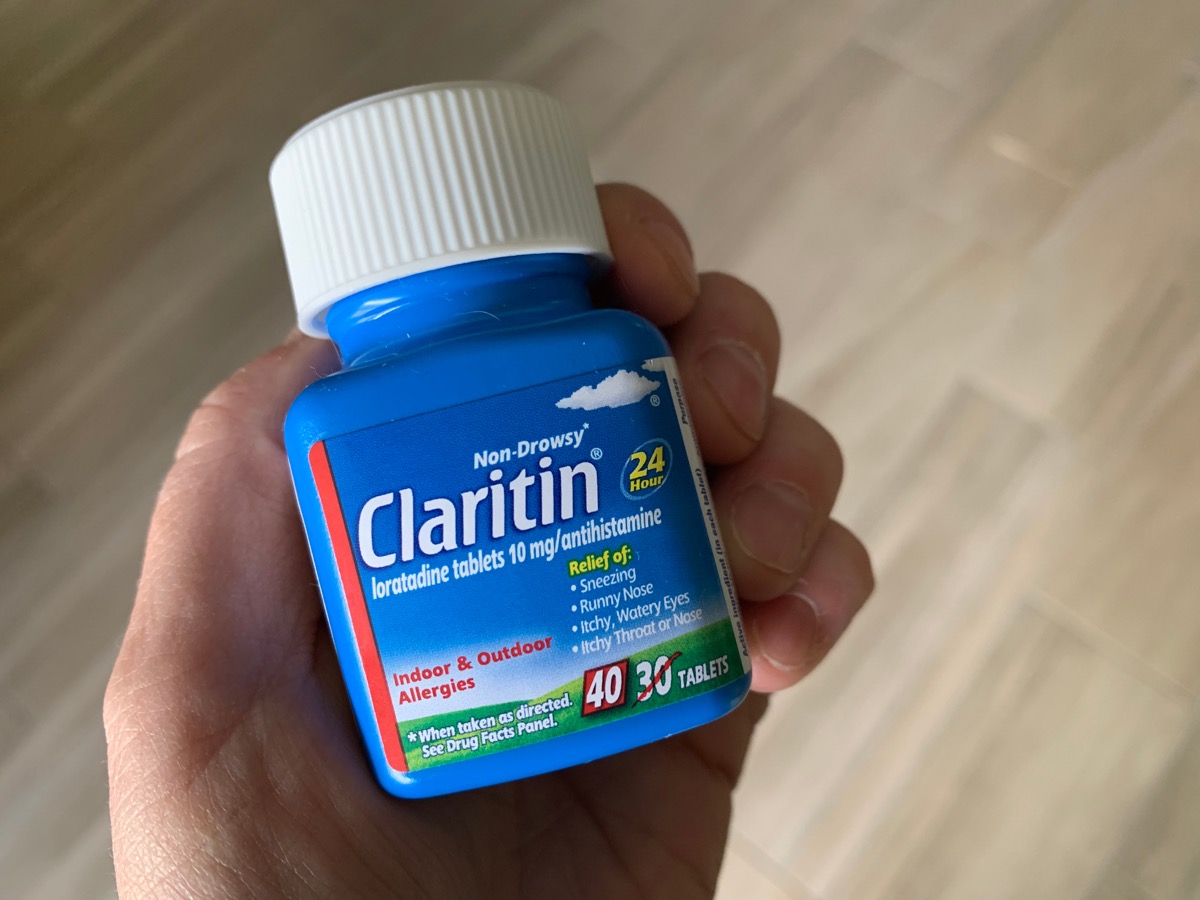What Happens If You Take Allergy Medication Every Day, Doctors Say
Plus, how to stop taking them—without the withdrawal symptoms.

Spring has arrived, and for millions of Americans who suffer from seasonal allergies, so have some very unpleasant symptoms. That's because as nature blooms around us, pollen, cut grass, and mold spores are released into the air, making their way into our respiratory systems. For those affected, this often results in runny nose, sneezing, itchy eyes, fatigue, coughing, and more. For all of its beauty, allergies can transform spring into a downright miserable time for some.
If you're looking for long-lasting relief, the good news is that there are many medicinal options available in the form of pills, liquids, nasal sprays, inhalers, and eye drops. However, you may be wondering if these are safe to take daily, and what effect they may have on your body long-term.
Read on to learn what happens to your body if you take allergy medication every day, and for one doctor's warning on why you should never stop taking them abruptly.
READ THIS NEXT: This Common Daily Medication May Become Harder to Find, Makers Say.
Some allergy medications are safe to take every day.

Available as both prescription and over-the-counter (OTC) drugs, a wide range of treatment options are available if you suffer from allergies. These include antihistamines, decongestants, corticosteroids, immunotherapy, leukotriene inhibitors, mast cell stabilizers, and others, according to the Mayo Clinic.
One OTC drug in particular is considered suitable for long-term, daily use. "Allergists recommend long-acting, non-sedating antihistamines—ones that won't make you sleepy—for everyday use," write experts from the Cleveland Clinic. This category would include brands such as Zyrtec, Claritin, and Allegra.
READ THIS NEXT: If You Take This Medication, You're More Likely to Get a Blood Clot.
They can come with side effects, however.

Experts point out that even drugs considered safe for daily use can still come with unwanted side effects. "People should be aware that over-the-counter medications are not always completely safe," says Kelly Johnson-Arbor, MD, a medical toxicologist and the Interim Executive Director for the National Capital Poison Center.
According to the U.K.'s National Health Services (NHS), side effects for non-sedating antihistamines include dry mouth, headache, and feeling sick. Moderate drowsiness is also listed as a possible side effect, even for certain products labeled as "non-drowsy."
Certain medications are not safe for daily use.

Some allergy medications should only be used as a short-term solution to your allergy symptoms. "Diphenhydramine, commonly known as Benadryl, is also an antihistamine, but it isn't recommended for everyday allergies," notes the Cleveland Clinic. "It's short-acting and very sedating, which can impact your day-to-day work and your ability to operate machinery (like your car)."
Similarly, decongestants—such as the nasal decongestant oxymetazoline (Afrin)—are not considered safe for daily use. "The package label for this medication states that the product should only be used for a maximum of three days," says Johnson-Arbor.
Prescription allergy medications should be taken as prescribed by your doctor.
For more health news sent directly to your inbox, sign up for our daily newsletter.
Some drugs can cause withdrawal symptoms if you stop them abruptly.

Johnson-Arbor explains that some medications are recommended for only short-term use because long-term, they can cause "an imbalance of chemicals within the body, which leads to worsening nasal congestion when the medication is finally stopped." This leads some people think they're addicted to Afrin, she explains, although the medical term for this condition (which is not Afrin addiction) is rhinitis medicamentosa.
Some over-the-counter allergy medications which are approved for everyday use—including Zyrtec and Xyzal—can cause other unpleasant side effects if you stop them abruptly. One of the most common withdrawal effects is itching, which many patients describe as "distinctly different (and often described as worse) than the itching associated with seasonal allergies," says Johnson-Arbor. "When the medications are restarted, symptoms typically go away, leading some people to believe that they have an addiction to the medication," she tells Best Life.
If you plan to take allergy medications every day for a long period of time, the toxicologist recommends slowly tapering your intake when you're ready to stop. Speak with your doctor or pharmacist to learn more about how to take or discontinue your allergy medications to minimize possible side effects or withdrawal symptoms.
Best Life offers the most up-to-date information from top experts, new research, and health agencies, but our content is not meant to be a substitute for professional guidance. When it comes to the medication you're taking or any other health questions you have, always consult your healthcare provider directly.





















